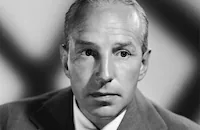You May Be Next!
Cast & Crew
Albert S. Rogell
Ann Sothern
Lloyd Nolan
Douglas Dumbrille
John Arledge
Berton Churchill
Film Details
Technical Specs

Synopsis
When Neil Bennett, chief engineer for the American Broadcasting Corp., accidentally throws a switch and jams the police radio signal, a group of bank robbers led by Beau Gardner are able to escape. Minutes later, Gardner hitchhikes a ride with Neil and his assistant, Eddie House, and invites them to visit his nightclub. At the club, Neil immediately falls for the beautiful singer, Fay Stevens, although Gardner is openly jealous. Neil obtains an audition for Fay the next day, but studio manager J. J. Held does not like her, so Neil appeals to the sponsor of "The Murgatroyd Hour." Having learned about Neil's inadvertant aid in his escape, Gardner plans to jam studio signals of selected broadcasts, beginning with Fay's appearance on "The Murgatroyd Hour." Before Fay can go on, however, Held fires Neil, and Fay is banned from the studio. When Neil returns to his apartment, Gardner's men seize him and take his equipment. Gardner then frames Neil for jamming the broadcast and has Neil and his machinery moved to a house near his club. Gardner blackmails J. J. Held, and commercial sponsors threaten to switch to a rival broadcaster. Meanwhile, Neil has been sending coded signals to Eddie from the farmhouse. Eddie and Fay find and release Neil. Before they can escape, however, Gardner and his men capture them. The police have picked up Neil's S.O.S., and they arrive in time to stop Gardner and his gang from making off with the equipment. Later, Gardner is sentenced to Alcatraz, and Neil and Fay go on a honeymoon.

Director
Albert S. Rogell
Cast

Ann Sothern

Lloyd Nolan

Douglas Dumbrille

John Arledge

Berton Churchill

Nana Bryant
Robert Middlemass

George Mckay
Gene Morgan
Clyde Dilson

Thurston Hall
Crew
Edward Bernds
Harry Cohn
Samuel Lange
William Mull
Fred Niblo Jr.
Robert North
John Rawlins
Ferdinand Reyher
Ferdinand Reyher
Sid Rogell
Allen G. Siegler
Henry Wales
James Whale

Film Details
Technical Specs

Articles
TCM Remembers - Ann Sothern

TCM Remembers - Ann Sothern
Quotes
Trivia
Notes
A working title for this film was Panic on the Air, a title that was subsequently used by Columbia for a 1936 film, directed by D. Ross Lederman, and starring Lew Ayres and Florence Rice. The film was also known as Calling All G-Men. This title was found in Columbia correspondence dated December 31, 1935. Two unidentified sungs are sung by Ann Sothern's character.














